The Cambridge History of Japan, Vol. 4: Early Modern Japan
Подождите немного. Документ загружается.

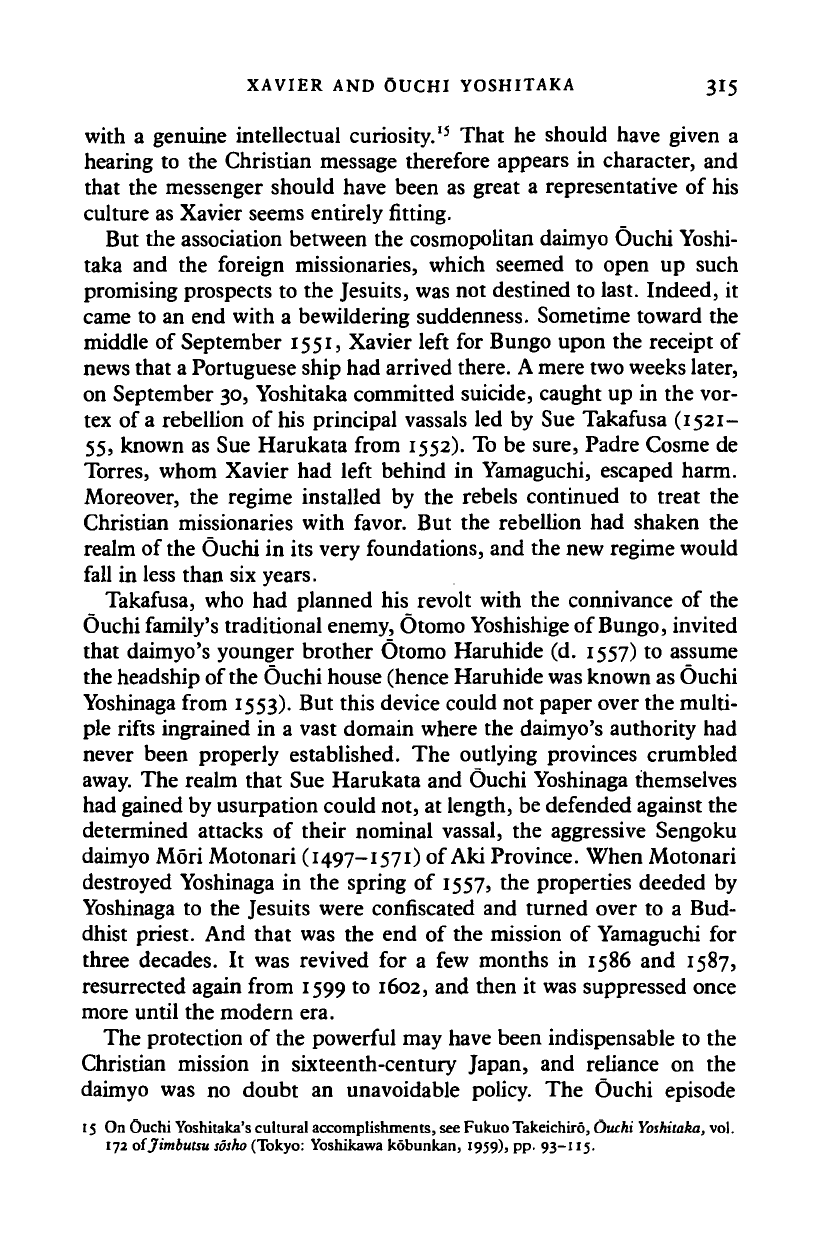
XAVIER AND OUCHI YOSHITAKA 315
with a genuine intellectual curiosity.
15
That he should have given a
hearing to the Christian message therefore appears in character, and
that the messenger should have been as great a representative of his
culture as Xavier seems entirely fitting.
But the association between the cosmopolitan daimyo Ouchi Yoshi-
taka and the foreign missionaries, which seemed to open up such
promising prospects to the Jesuits, was not destined to last. Indeed, it
came to an end with a bewildering suddenness. Sometime toward the
middle of September 1551, Xavier left for Bungo upon the receipt of
news that a Portuguese ship had arrived there.
A
mere two weeks later,
on September 30, Yoshitaka committed suicide, caught up in the vor-
tex of a rebellion of his principal vassals led by Sue Takafusa
(1521-
55,
known as Sue Harukata from 1552). To be sure, Padre Cosme de
Torres, whom Xavier had left behind in Yamaguchi, escaped harm.
Moreover, the regime installed by the rebels continued to treat the
Christian missionaries with favor. But the rebellion had shaken the
realm of the Ouchi in its very foundations, and the new regime would
fall in less than six years.
Takafusa, who had planned his revolt with the connivance of the
Ouchi family's traditional enemy, Otomo Yoshishige of Bungo, invited
that daimyo's younger brother Otomo Haruhide (d. 1557) to assume
the headship of the Ouchi house (hence Haruhide was known as Ouchi
Yoshinaga from 1553). But this device could not paper over the multi-
ple rifts ingrained in a vast domain where the daimyo's authority had
never been properly established. The outlying provinces crumbled
away. The realm that Sue Harukata and Ouchi Yoshinaga themselves
had gained by usurpation could not, at length, be defended against the
determined attacks of their nominal vassal, the aggressive Sengoku
daimyo Mori Motonari (1497-1571) of
Aki
Province. When Motonari
destroyed Yoshinaga in the spring of 1557, the properties deeded by
Yoshinaga to the Jesuits were confiscated and turned over to a Bud-
dhist priest. And that was the end of the mission of Yamaguchi for
three decades. It was revived for a few months in 1586 and 1587,
resurrected again from 1599 to 1602, and then it was suppressed once
more until the modern era.
The protection of the powerful may have been indispensable to the
Christian mission in sixteenth-century Japan, and reliance on the
daimyo was no doubt an unavoidable policy. The Ouchi episode
15 On Ouchi Yoshitaka's cultural accomplishments, see Fukuo
Takeichiro,
Ouchi
Yoshitaka,
vol.
172 otjimbutsu
sdsho
(Tokyo: Yoshikawa kobunkan, 1959), pp. 93-115.
Cambridge Histories Online © Cambridge University Press, 2008
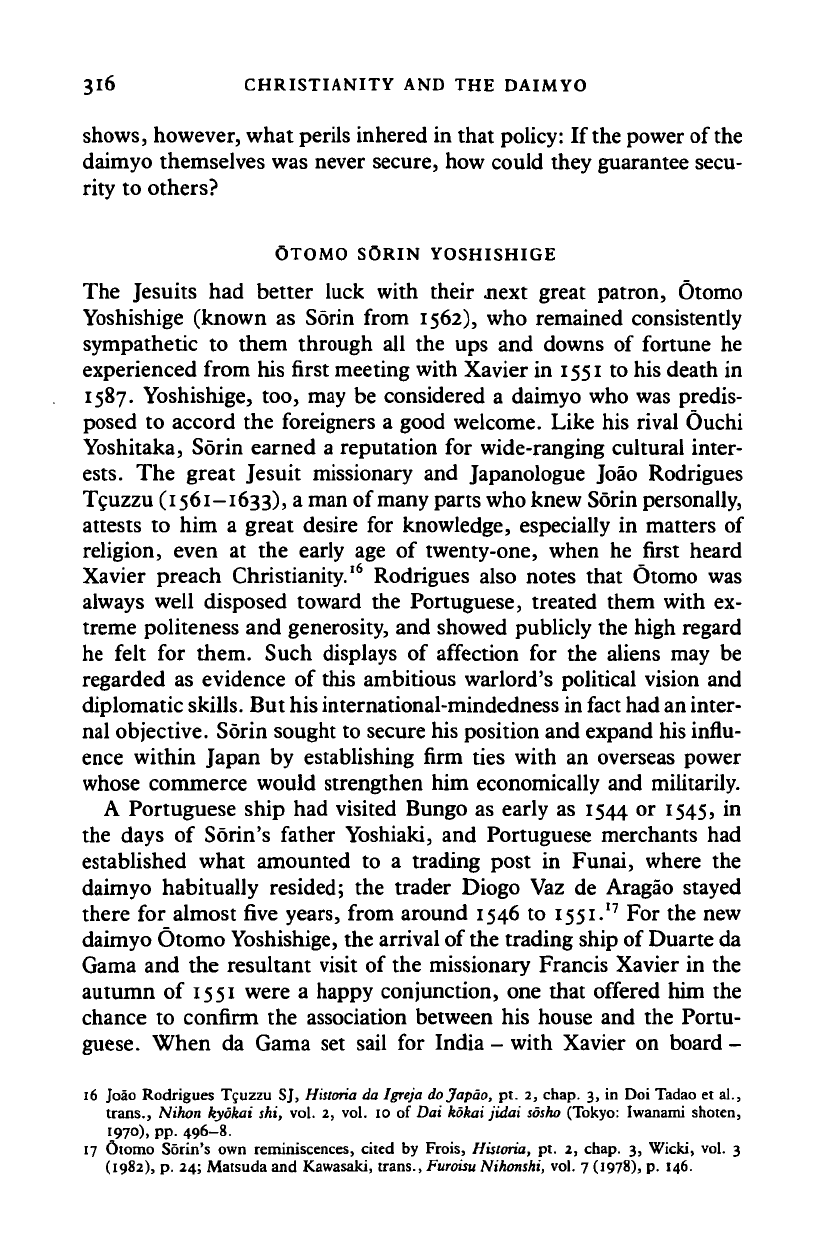
316 CHRISTIANITY AND THE DAIMYO
shows, however, what perils inhered in that policy: If the power of the
daimyo themselves was never secure, how could they guarantee secu-
rity to others?
OTOMO
SORIN YOSHISHIGE
The Jesuits had better luck with their next great patron, Otomo
Yoshishige (known as Sorin from 1562), who remained consistently
sympathetic to them through all the ups and downs of fortune he
experienced from his first meeting with Xavier in 1551 to his death in
1587.
Yoshishige, too, may be considered a daimyo who was predis-
posed to accord the foreigners a good welcome. Like his rival Ouchi
Yoshitaka, Sorin earned a reputation for wide-ranging cultural inter-
ests.
The great Jesuit missionary and Japanologue Joao Rodrigues
Tcuzzu (1561-1633), a man of many parts who knew Sorin personally,
attests to him a great desire for knowledge, especially in matters of
religion, even at the early age of twenty-one, when he first heard
Xavier preach Christianity.
16
Rodrigues also notes that Otomo was
always well disposed toward the Portuguese, treated them with ex-
treme politeness and generosity, and showed publicly the high regard
he felt for them. Such displays of affection for the aliens may be
regarded as evidence of this ambitious warlord's political vision and
diplomatic
skills.
But his international-mindedness in fact had an inter-
nal objective. Sorin sought to secure his position and expand his influ-
ence within Japan by establishing firm ties with an overseas power
whose commerce would strengthen him economically and militarily.
A Portuguese ship had visited Bungo as early as 1544 or 1545, in
the days of Sorin's father Yoshiaki, and Portuguese merchants had
established what amounted to a trading post in Funai, where the
daimyo habitually resided; the trader Diogo Vaz de Aragao stayed
there for almost five years, from around 1546 to
1551.
17
For the new
daimyo Otomo Yoshishige, the arrival of the trading ship of Duarte da
Gama and the resultant visit of the missionary Francis Xavier in the
autumn of 1551 were a happy conjunction, one that offered him the
chance to confirm the association between his house and the Portu-
guese. When da Gama set sail for India - with Xavier on board -
16 Joao Rodrigues Tcuzzu SJ, Hinoria da Igreja dojapdo, pt. 2, chap. 3, in Doi Tadao et al.,
trans.,
Nikon kyokai shi, vol. 2, vol. 10 of Dai kokai jidai sosho (Tokyo: Iwanami shoten,
1970),
pp. 496-8.
17 Otomo Sorin's own reminiscences, cited by Frois, Hiswria, pt. 2, chap. 3, Wicki, vol. 3
(1982),
p. 24; Matsuda and Kawasaki, trans.,
Furoisu
Nikonshi, vol. 7 (1978), p. 146.
Cambridge Histories Online © Cambridge University Press, 2008
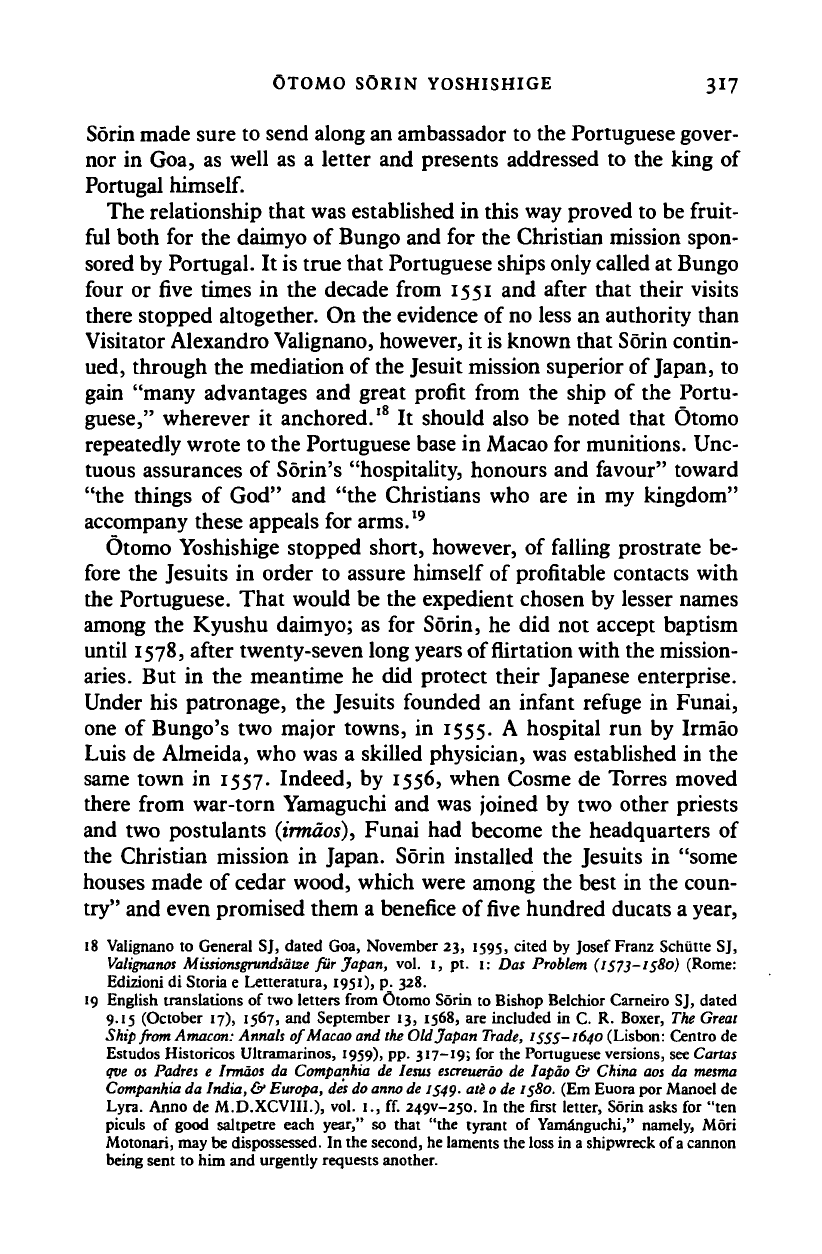
OTOMO SORIN YOSHISHIGE 317
Sorin made sure to send along an ambassador to the Portuguese gover-
nor in Goa, as well as a letter and presents addressed to the king of
Portugal
himself.
The relationship that was established in this way proved to be fruit-
ful both for the daimyo of Bungo and for the Christian mission spon-
sored by Portugal. It is true that Portuguese ships only called at Bungo
four or five times in the decade from 1551 and after that their visits
there stopped altogether. On the evidence of no less an authority than
Visitator Alexandra Valignano, however, it is known that Sorin contin-
ued, through the mediation of the Jesuit mission superior of Japan, to
gain "many advantages and great profit from the ship of the Portu-
guese," wherever it anchored.'
8
It should also be noted that Otomo
repeatedly wrote to the Portuguese base in Macao for munitions. Unc-
tuous assurances of Sorin's "hospitality, honours and favour" toward
"the things of God" and "the Christians who are in my kingdom"
accompany these appeals for arms.
19
Otomo Yoshishige stopped short, however, of falling prostrate be-
fore the Jesuits in order to assure himself of profitable contacts with
the Portuguese. That would be the expedient chosen by lesser names
among the Kyushu daimyo; as for Sorin, he did not accept baptism
until 1578, after twenty-seven long years of flirtation with the mission-
aries.
But in the meantime he did protect their Japanese enterprise.
Under his patronage, the Jesuits founded an infant refuge in Funai,
one of Bungo's two major towns, in 1555. A hospital run by Irmao
Luis de Almeida, who was a skilled physician, was established in the
same town in 1557. Indeed, by 1556, when Cosme de Torres moved
there from war-torn Yamaguchi and was joined by two other priests
and two postulants
(irmdos),
Funai had become the headquarters of
the Christian mission in Japan. Sorin installed the Jesuits in "some
houses made of cedar wood, which were among the best in the coun-
try" and even promised them a benefice of five hundred ducats a year,
18 Valignano to General SJ, dated Goa, November 23, 1595, cited by Josef Franz Schiitte SJ,
Valignanos Missionsgrundsdtze
fur Japan, vol. 1, pt. 1: Das Problem (1573-1580) (Rome:
Edizioni di Storia e Letteratura, 1931), p. 328.
19 English translations of two letters from Otomo Sorin to Bishop Belchior Carneiro SJ, dated
9.15 (October 17), 1567, and September 13, 1568, are included in C. R. Boxer, The Great
Ship from Amacon: Annals of Macao and the Old Japan Trade, 1555-1640 (Lisbon: Centro de
Estudos Historicos Ultramarinos, 1959), pp. 317-19; for the Portuguese versions, see Cartas
qve os Padres e Irmdos da Companhia de lesus
escreuerao
de lapao & China aos da mesma
Companhia da India, & Europa,
des
do
anno
de 1549. ati o de 1580. (Em Euora por Manoel de
Lyra. Anno de M.D.XCVIII.), vol. 1., ff. 249V-250. In the first letter, Sorin asks for "ten
piculs of good saltpetre each year," so that "the tyrant of Yamanguchi," namely, Mori
Motonari, may be dispossessed. In the second, he laments the loss in a shipwreck of
a
cannon
being sent to him and urgently requests another.
Cambridge Histories Online © Cambridge University Press, 2008
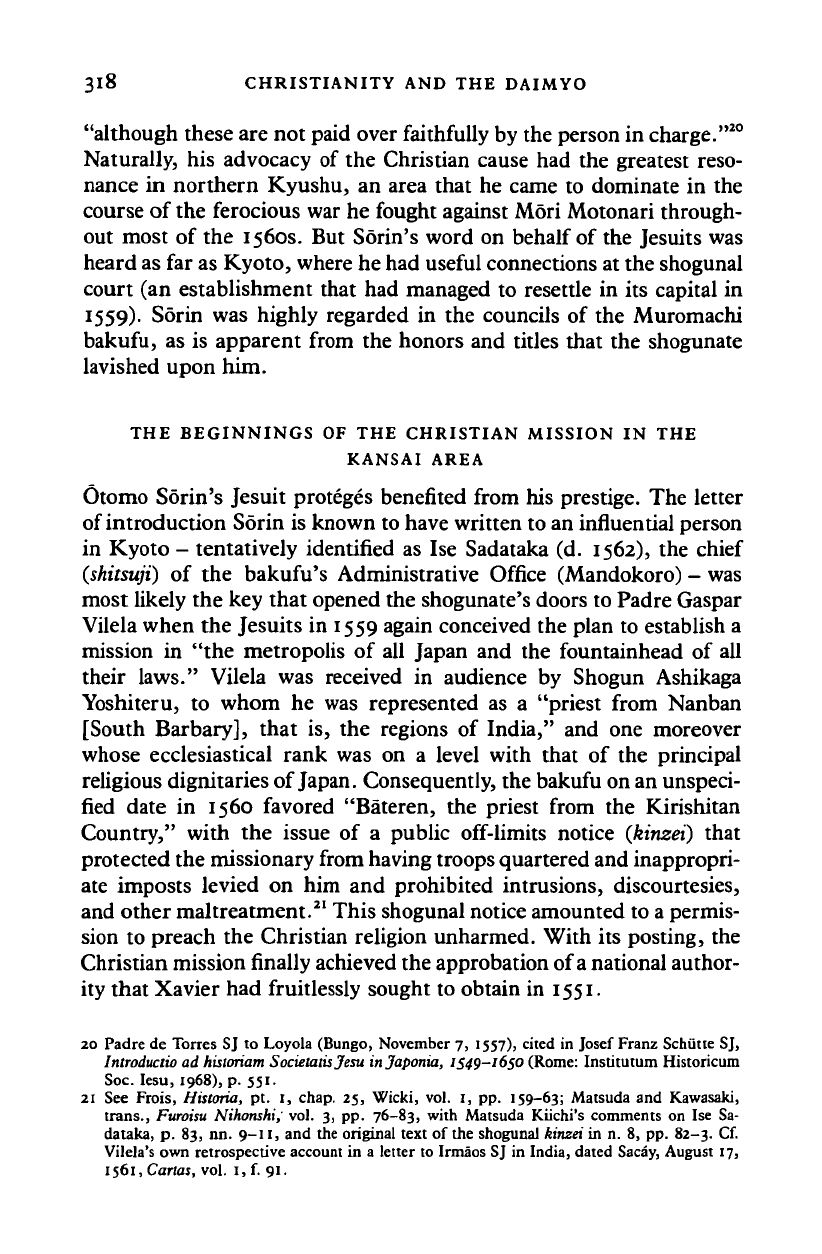
3l8 CHRISTIANITY AND THE DAIMYO
"although these are not paid over faithfully by the person in charge."
20
Naturally,
his
advocacy
of the
Christian cause
had the
greatest reso-
nance
in
northern Kyushu,
an
area that
he
came
to
dominate
in the
course
of
the ferocious war he fought against Mori Motonari through-
out most
of
the 1560s.
But
Sorin's word
on
behalf
of
the Jesuits was
heard as
far
as Kyoto, where he had useful connections at the shogunal
court
(an
establishment that
had
managed
to
resettle
in its
capital
in
J
559)-
Sorin
was
highly regarded
in the
councils
of
the Muromachi
bakufu,
as is
apparent from
the
honors
and
titles that
the
shogunate
lavished upon him.
THE BEGINNINGS OF THE CHRISTIAN MISSION IN THE
KANSAI AREA
Otomo Sorin's Jesuit proteges benefited from his prestige. The letter
of introduction Sorin
is
known to have written to an influential person
in Kyoto
-
tentatively identified
as Ise
Sadataka
(d.
1562),
the
chief
(shitsuji)
of the
bakufu's Administrative Office (Mandokoro)
-
was
most likely the key that opened the shogunate's doors to Padre Gaspar
Vilela when
the
Jesuits
in
1559 again conceived the plan
to
establish
a
mission
in "the
metropolis
of all
Japan
and the
fountainhead
of all
their laws." Vilela
was
received
in
audience
by
Shogun Ashikaga
Yoshiteru,
to
whom
he was
represented
as a
"priest from Nanban
[South Barbary], that
is, the
regions
of
India,"
and one
moreover
whose ecclesiastical rank
was on a
level with that
of the
principal
religious dignitaries of Japan. Consequently, the bakufu on an unspeci-
fied date
in 1560
favored "Bateren,
the
priest from
the
Kirishitan
Country," with
the
issue
of a
public off-limits notice (kinzei) that
protected the missionary from having troops quartered and inappropri-
ate imposts levied
on him and
prohibited intrusions, discourtesies,
and other maltreatment.
21
This shogunal notice amounted to a permis-
sion
to
preach
the
Christian religion unharmed. With
its
posting,
the
Christian mission finally achieved the approbation of
a
national author-
ity that Xavier had fruitlessly sought to obtain
in
1551.
20 Padre
de
Torres
SJ to
Loyola (Bungo, November
7,
1557), cited
in
Josef Franz Schutie
SJ,
Introductio
ad
hisloriam Societalis Jesu injaponia, 1549-1650 (Rome: Institutum Historicum
Soc.
Iesu, 1968),
p. 551.
21
See
Frois, Historia,
pt. 1,
chap.
25,
Wicki,
vol. z, pp.
159-63; Matsuda
and
Kawasaki,
trans.,
Furoisu Nihonshi;
vol. 3, pp.
76-83, with Matsuda Kudu's comments
on Ise Sa-
dataka,
p. 83, nn.
9-11,
and the
original text
of
the shogunal kinzei
in n. 8, pp.
82-3.
Cf.
Vilela's
own
retrospective account
in a
letter
to
Irmaos
SJ in
India, dated Sacay, August
17,
1561,
Carlas,
vol. I, f. 91.
Cambridge Histories Online © Cambridge University Press, 2008
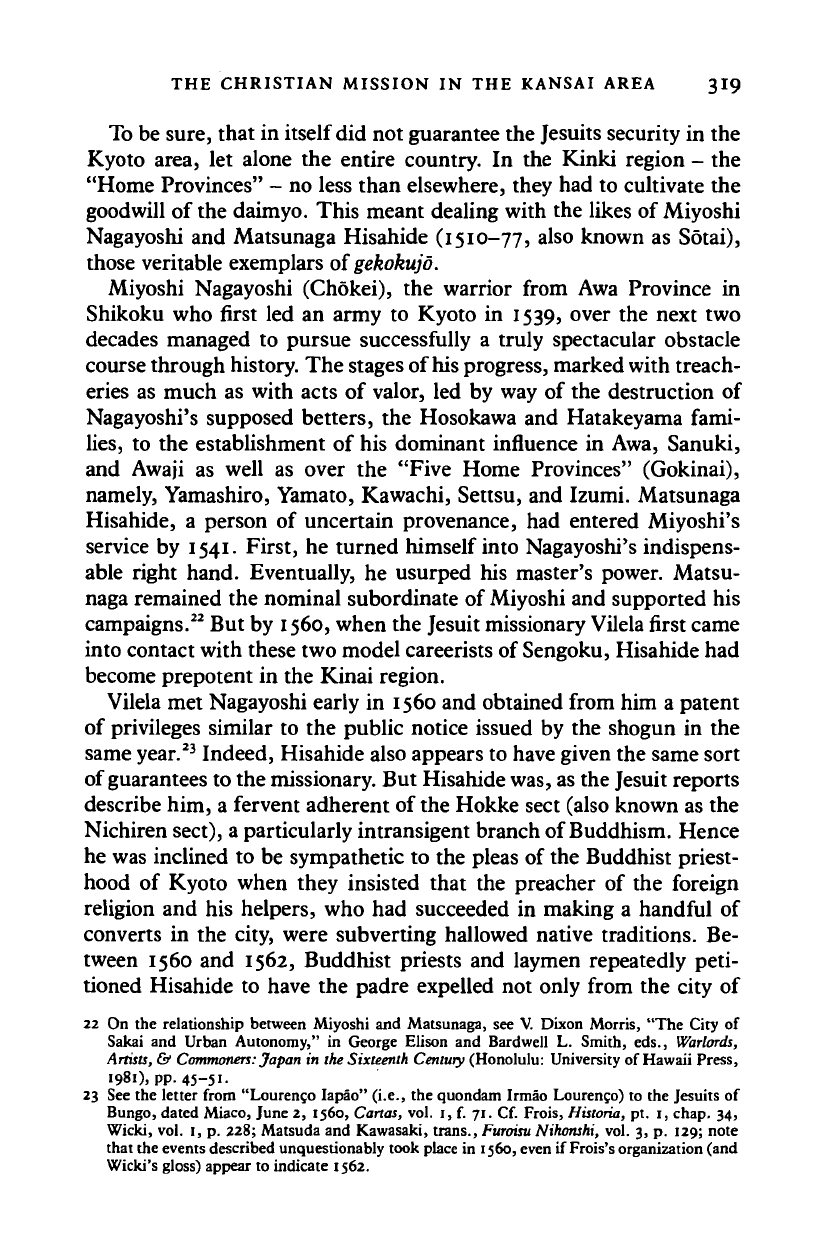
THE CHRISTIAN MISSION IN THE KANSAI AREA 319
To be sure, that in itself did not guarantee the Jesuits security in the
Kyoto area, let alone the entire country. In the Kinki region - the
"Home Provinces" - no less than elsewhere, they had to cultivate the
goodwill of the daimyo. This meant dealing with the likes of Miyoshi
Nagayoshi and Matsunaga Hisahide (1510-77, also known as Sotai),
those veritable exemplars of gekokujo.
Miyoshi Nagayoshi (Chokei), the warrior from Awa Province in
Shikoku who first led an army to Kyoto in 1539, over the next two
decades managed to pursue successfully a truly spectacular obstacle
course through history. The stages of
his
progress,
marked with treach-
eries as much as with acts of valor, led by way of the destruction of
Nagayoshi's supposed betters, the Hosokawa and Hatakeyama fami-
lies,
to the establishment of his dominant influence in Awa, Sanuki,
and Awaji as well as over the "Five Home Provinces" (Gokinai),
namely, Yamashiro, Yamato, Kawachi, Settsu, and Izumi. Matsunaga
Hisahide, a person of uncertain provenance, had entered Miyoshi's
service by 1541. First, he turned himself into Nagayoshi's indispens-
able right hand. Eventually, he usurped his master's power. Matsu-
naga remained the nominal subordinate of Miyoshi and supported his
campaigns.
22
But by 1560, when the Jesuit missionary Vilela first came
into contact with these two model careerists of Sengoku, Hisahide had
become prepotent in the Kinai region.
Vilela met Nagayoshi early in 1560 and obtained from him a patent
of privileges similar to the public notice issued by the shogun in the
same year.
23
Indeed, Hisahide also appears to have given the same sort
of guarantees to the missionary. But Hisahide
was,
as the Jesuit reports
describe him, a fervent adherent of the Hokke sect (also known as the
Nichiren sect), a particularly intransigent branch of
Buddhism.
Hence
he was inclined to be sympathetic to the pleas of the Buddhist priest-
hood of Kyoto when they insisted that the preacher of the foreign
religion and his helpers, who had succeeded in making a handful of
converts in the city, were subverting hallowed native traditions. Be-
tween 1560 and 1562, Buddhist priests and laymen repeatedly peti-
tioned Hisahide to have the padre expelled not only from the city of
22 On the relationship between Miyoshi and Matsunaga, see V. Dixon Morris, "The City of
Sakai and Urban Autonomy," in George Elison and Bardwell L. Smith, eds., Warlords,
Artists, &
Commoners:
Japan in the Sixteenth Century (Honolulu: University of Hawaii Press,
1981),
pp.
45-51.
23 See the letter from "Lourenco Iapao" (i.e., the quondam Irmao Lourenco) to the Jesuits of
Bungo, dated Miaco, June 2, 1560, Cartas, vol. 1, f. 71. Cf. Frois, Historia, pt. 1, chap. 34,
Wicki, vol. 1, p. 228; Matsuda and Kawasaki, trans.,
Furoisu
Nihonshi, vol. 3, p. 129; note
that the events described unquestionably took place in 1560, even if Frois's organization (and
Wicki's gloss) appear to indicate 1562.
Cambridge Histories Online © Cambridge University Press, 2008
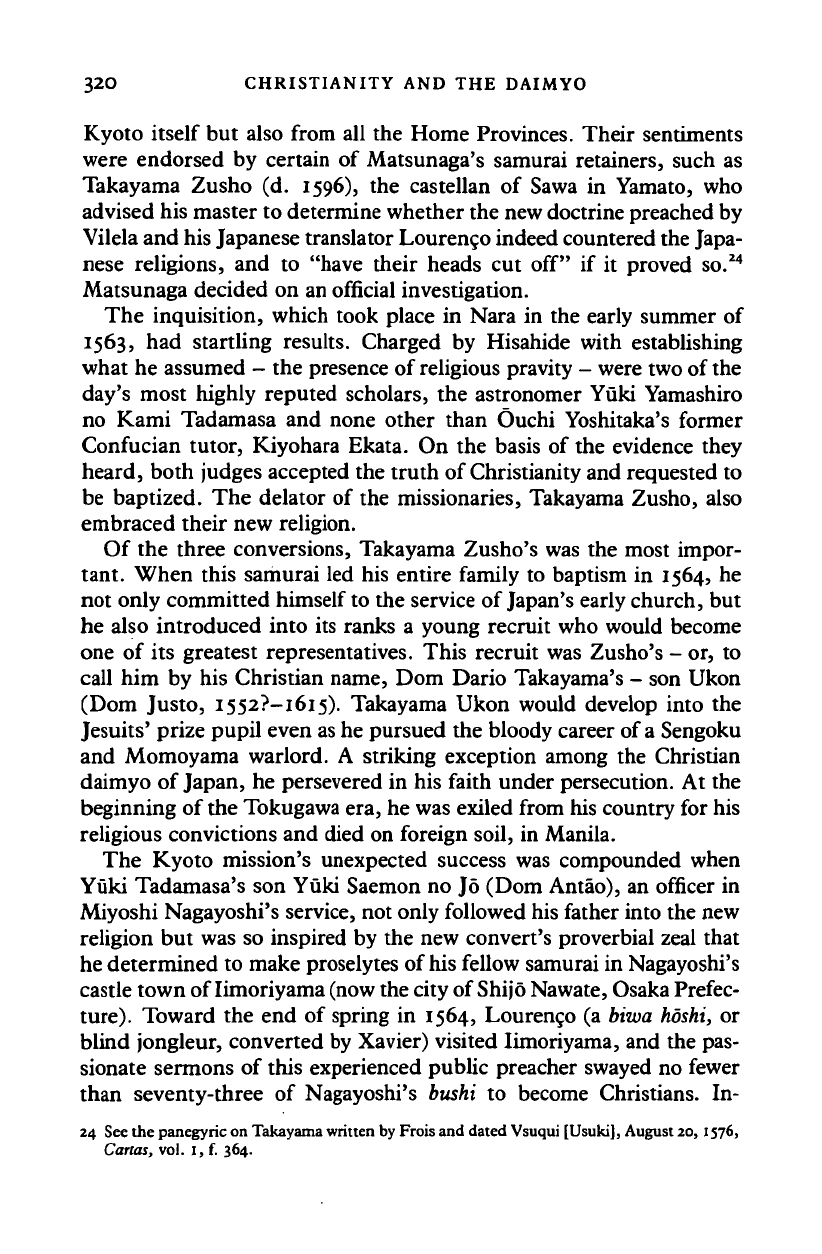
32O CHRISTIANITY AND THE DAIMYO
Kyoto itself
but
also from
all the
Home Provinces. Their sentiments
were endorsed
by
certain
of
Matsunaga's samurai retainers, such
as
Takayama Zusho
(d.
1596),
the
castellan
of
Sawa
in
Yamato,
who
advised his master to determine whether the new doctrine preached by
Vilela and his Japanese translator Lourenco indeed countered the Japa-
nese religions,
and to
"have their heads
cut off" if it
proved
so.
24
Matsunaga decided
on
an official investigation.
The inquisition, which took place
in
Nara
in the
early summer
of
1563,
had
startling results. Charged
by
Hisahide with establishing
what
he
assumed
-
the presence
of
religious pravity
-
were two
of
the
day's most highly reputed scholars,
the
astronomer Yuki Yamashiro
no Kami Tadamasa
and
none other than Ouchi Yoshitaka's former
Confucian tutor, Kiyohara Ekata.
On the
basis
of
the evidence they
heard, both judges accepted the truth
of
Christianity and requested
to
be baptized.
The
delator
of the
missionaries, Takayama Zusho, also
embraced their new religion.
Of
the
three conversions, Takayama Zusho's was
the
most impor-
tant. When this samurai
led his
entire family
to
baptism
in
1564,
he
not only committed himself to the service
of
Japan's early church,
but
he also introduced into
its
ranks
a
young recruit who would become
one
of its
greatest representatives. This recruit was Zusho's
-
or,
to
call
him by his
Christian name,
Dom
Dario Takayama's
- son
Ukon
(Dom Justo,
I552?-I6I5).
Takayama Ukon would develop into
the
Jesuits' prize pupil even as he pursued
the
bloody career
of
a
Sengoku
and Momoyama warlord.
A
striking exception among
the
Christian
daimyo
of
Japan,
he
persevered
in his
faith under persecution.
At the
beginning
of
the Tokugawa era, he was exiled from his country
for
his
religious convictions and died
on
foreign soil,
in
Manila.
The Kyoto mission's unexpected success
was
compounded when
Yuki Tadamasa's
son
Yuki Saemon
no Jo
(Dom Antao),
an
officer
in
Miyoshi Nagayoshi's service, not only followed his father into the new
religion
but
was
so
inspired
by the
new convert's proverbial zeal that
he determined
to
make proselytes
of
his fellow samurai
in
Nagayoshi's
castle town of Iimoriyama (now the city of Shi jo Nawate, Osaka Prefec-
ture).
Toward
the end of
spring
in
1564, Lourenco
(a
biwa
hoshi,
or
blind jongleur, converted by Xavier) visited Iimoriyama,
and
the pas-
sionate sermons
of
this experienced public preacher swayed
no
fewer
than seventy-three
of
Nagayoshi's bushi
to
become Christians.
In-
24 See the panegyric on Takayama written by Frois and dated Vsuqui
[Usuki],
August 20,1576,
Cartas,
vol.
I, f.
364.
Cambridge Histories Online © Cambridge University Press, 2008
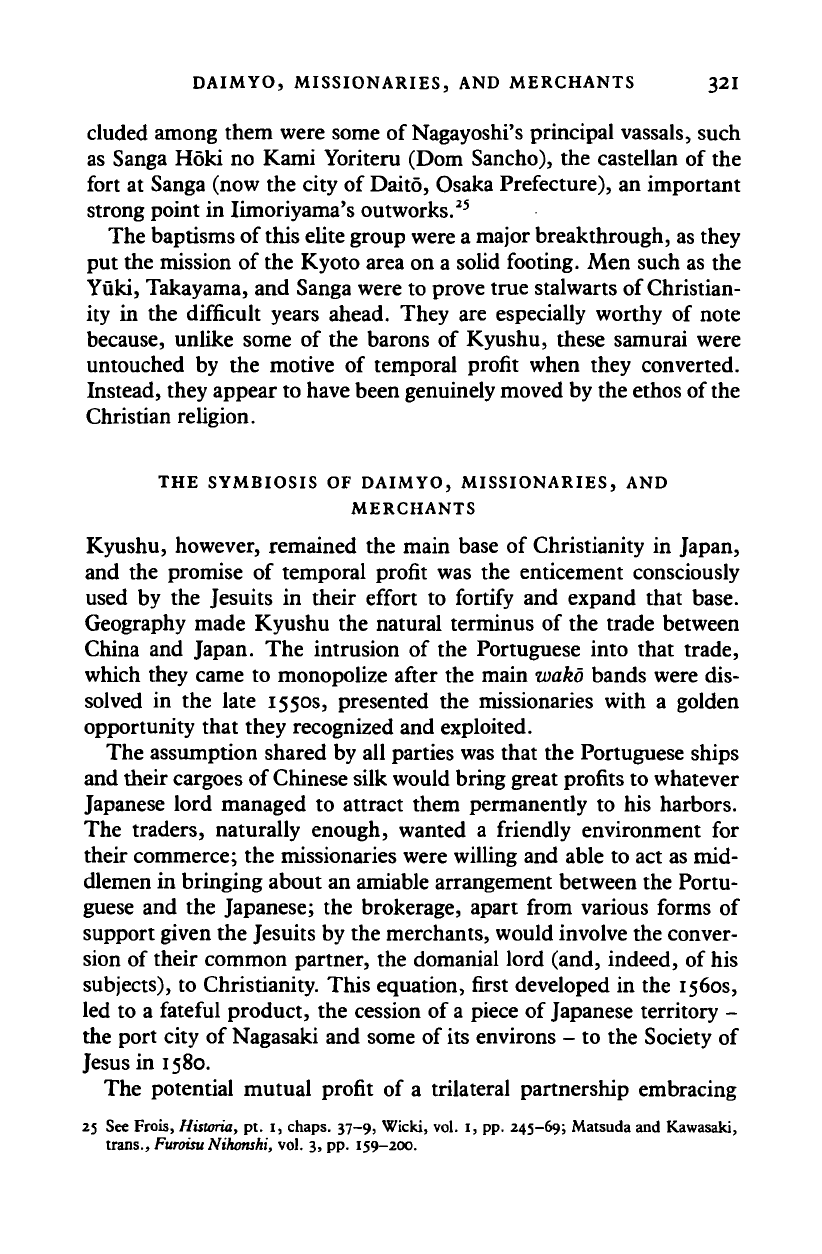
DAIMYO, MISSIONARIES, AND MERCHANTS 321
eluded among them were some of Nagayoshi's principal vassals, such
as Sanga Hoki no Kami Yoriteru (Dom Sancho), the castellan of the
fort at Sanga (now the city of Daito, Osaka Prefecture), an important
strong point in Iimoriyama's outworks.
25
The baptisms of this elite group were a major breakthrough, as they
put the mission of the Kyoto area on a solid footing. Men such as the
Yuki, Takayama, and Sanga were to prove true stalwarts of Christian-
ity in the difficult years ahead. They are especially worthy of note
because, unlike some of the barons of Kyushu, these samurai were
untouched by the motive of temporal profit when they converted.
Instead, they appear to have been genuinely moved by the ethos of the
Christian religion.
THE SYMBIOSIS OF DAIMYO, MISSIONARIES, AND
MERCHANTS
Kyushu, however, remained the main base of Christianity in Japan,
and the promise of temporal profit was the enticement consciously
used by the Jesuits in their effort to fortify and expand that base.
Geography made Kyushu the natural terminus of the trade between
China and Japan. The intrusion of the Portuguese into that trade,
which they came to monopolize after the main wako bands were dis-
solved in the late 1550s, presented the missionaries with a golden
opportunity that they recognized and exploited.
The assumption shared by all parties was that the Portuguese ships
and their cargoes of Chinese silk would bring great profits to whatever
Japanese lord managed to attract them permanently to his harbors.
The traders, naturally enough, wanted a friendly environment for
their commerce; the missionaries were willing and able to act as mid-
dlemen in bringing about an amiable arrangement between the Portu-
guese and the Japanese; the brokerage, apart from various forms of
support given the Jesuits by the merchants, would involve the conver-
sion of their common partner, the domanial lord (and, indeed, of his
subjects), to Christianity. This equation, first developed in the 1560s,
led to a fateful product, the cession of
a
piece of Japanese territory -
the port city of Nagasaki and some of its environs - to the Society of
Jesus in 1580.
The potential mutual profit of a trilateral partnership embracing
25 See Frois, Historia, pt. I, chaps. 37-9, Wicki, vol. I, pp. 245-69; Matsuda and Kawasaki,
trans.,
Furoisu
Nihonshi, vol. 3, pp. 159-200.
Cambridge Histories Online © Cambridge University Press, 2008
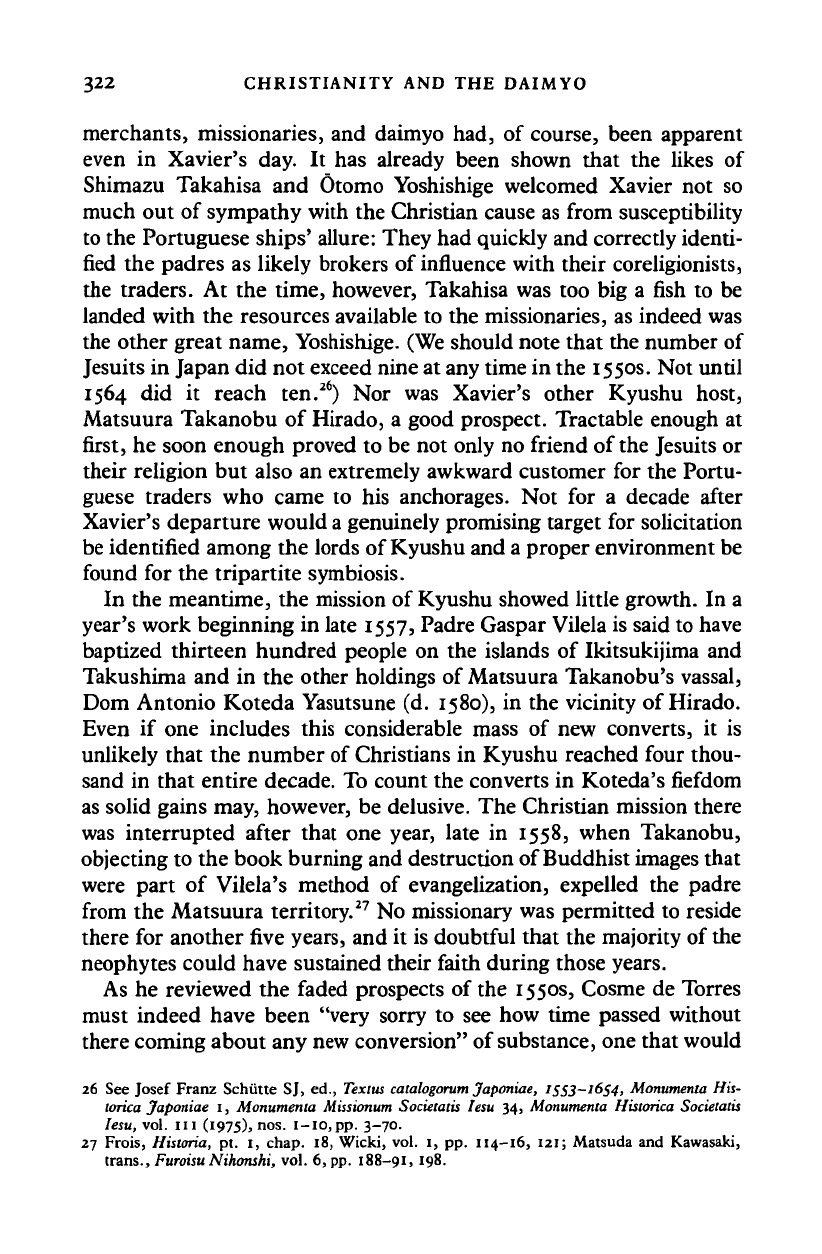
322 CHRISTIANITY
AND THE
DAIMYO
merchants, missionaries,
and
daimyo
had, of
course, been apparent
even
in
Xavier's
day. It has
already been shown that
the
likes
of
Shimazu Takahisa
and
Otomo Yoshishige welcomed Xavier
not so
much
out of
sympathy with
the
Christian cause
as
from susceptibility
to
the
Portuguese ships' allure: They had quickly and correctly identi-
fied the padres
as
likely brokers
of
influence with their coreligionists,
the traders.
At the
time, however, Takahisa
was too big a
fish
to be
landed with
the
resources available
to the
missionaries,
as
indeed was
the other great name, Yoshishige. (We should note that
the
number of
Jesuits
in
Japan
did not
exceed nine
at
any time
in
the 1550s. Not until
1564
did it
reach ten.
26
)
Nor was
Xavier's other Kyushu host,
Matsuura Takanobu
of
Hirado,
a
good prospect. Tractable enough
at
first, he soon enough proved
to be not
only
no
friend
of
the Jesuits
or
their religion
but
also
an
extremely awkward customer
for the
Portu-
guese traders
who
came
to his
anchorages.
Not for a
decade after
Xavier's departure would
a
genuinely promising target
for
solicitation
be identified among
the
lords
of
Kyushu and
a
proper environment
be
found
for the
tripartite symbiosis.
In
the
meantime,
the
mission
of
Kyushu showed little growth.
In a
year's work beginning
in
late 1557, Padre Gaspar Vilela is said to have
baptized thirteen hundred people
on the
islands
of
Ikitsukijima
and
Takushima
and in the
other holdings
of
Matsuura Takanobu's vassal,
Dom Antonio Koteda Yasutsune
(d.
1580),
in the
vicinity
of
Hirado.
Even
if one
includes this considerable mass
of new
converts,
it is
unlikely that
the
number
of
Christians
in
Kyushu reached four thou-
sand
in
that entire decade.
To
count
the
converts
in
Koteda's fiefdom
as solid gains may, however,
be
delusive.
The
Christian mission there
was interrupted after that
one
year, late
in 1558,
when Takanobu,
objecting
to the
book burning and destruction of Buddhist images that
were part
of
Vilela's method
of
evangelization, expelled
the
padre
from
the
Matsuura territory.
27
No
missionary was permitted
to
reside
there
for
another five years, and
it is
doubtful that
the
majority
of
the
neophytes could have sustained their faith during those years.
As
he
reviewed
the
faded prospects
of
the 1550s, Cosme
de
Torres
must indeed have been "very sorry
to see how
time passed without
there coming about
any
new conversion"
of
substance,
one that would
26
See
Josef Franz Schutte
SJ, ed.,
Textus
catalogorum
Japoniae, lSS3-l6S4> Monumenta
His-
lorica Japoniae
I,
Monumenta Mtssionum Societatis Iesu
34,
Monumenta Hislorica Socielalis
Iesu, vol. in (1975), nos. 1-10, pp. 3-70.
27 Frois, Historia, pt. 1, chap. 18, Wicki, vol. 1, pp. 114-16, 121; Matsuda and Kawasaki,
trans.,
Furoisu
Nihonshi, vol. 6, pp.
188-91,
198.
Cambridge Histories Online © Cambridge University Press, 2008
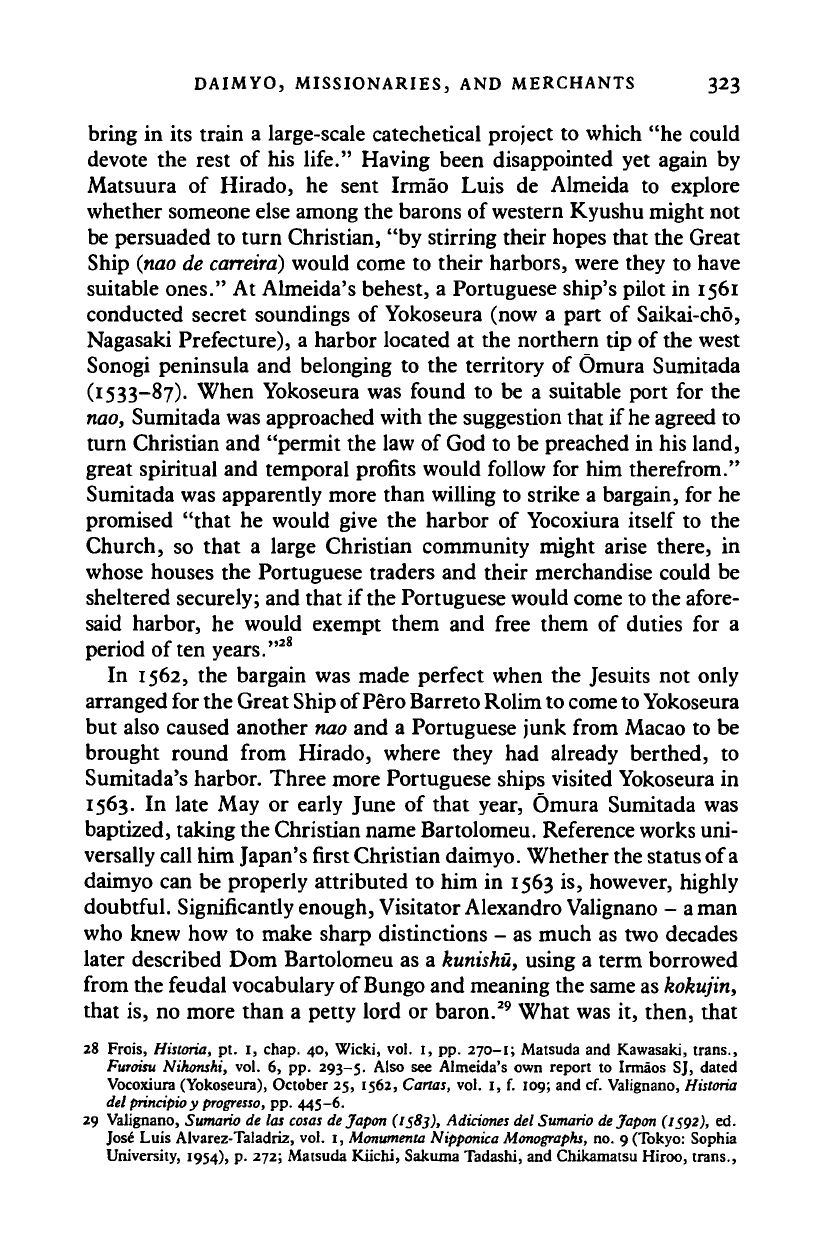
DAIMYO, MISSIONARIES, AND MERCHANTS 323
bring in its train a large-scale catechetical project to which "he could
devote the rest of his life." Having been disappointed yet again by
Matsuura of Hirado, he sent Irmao Luis de Almeida to explore
whether someone else among the barons of western Kyushu might not
be persuaded to turn Christian, "by stirring their hopes that the Great
Ship
(nao
de
carreira)
would come to their harbors, were they to have
suitable ones." At Almeida's behest, a Portuguese ship's pilot in 1561
conducted secret soundings of Yokoseura (now a part of Saikai-cho,
Nagasaki Prefecture), a harbor located at the northern tip of the west
Sonogi peninsula and belonging to the territory of Omura Sumitada
(1533-87). When Yokoseura was found to be a suitable port for the
nao,
Sumitada was approached with the suggestion that if he agreed to
turn Christian and "permit the law of God to be preached in his land,
great spiritual and temporal profits would follow for him therefrom."
Sumitada was apparently more than willing to strike a bargain, for he
promised "that he would give the harbor of Yocoxiura itself to the
Church, so that a large Christian community might arise there, in
whose houses the Portuguese traders and their merchandise could be
sheltered securely; and that if the Portuguese would come to the afore-
said harbor, he would exempt them and free them of duties for a
period often years."
28
In 1562, the bargain was made perfect when the Jesuits not only
arranged for the Great
Ship
of Pero Barreto Rolim
to
come
to
Yokoseura
but also caused another
nao
and a Portuguese junk from Macao to be
brought round from Hirado, where they had already berthed, to
Sumitada's harbor. Three more Portuguese ships visited Yokoseura in
1563.
In late May or early June of that year, Omura Sumitada was
baptized, taking the Christian name Bartolomeu. Reference works uni-
versally call him Japan's first Christian
daimyo.
Whether the status of a
daimyo can be properly attributed to him in 1563 is, however, highly
doubtful. Significantly enough, Visitator Alexandro Valignano -
a
man
who knew how to make sharp distinctions - as much as two decades
later described Dom Bartolomeu as a
kunishu,
using a term borrowed
from the feudal vocabulary of Bungo and meaning the same as kokujin,
that is, no more than a petty lord or baron.
29
What was it, then, that
28 Frois, Historia, pt. 1, chap. 40, Wicki, vol. 1, pp.
270-1;
Matsuda and Kawasaki, trans.,
Furoisu Nihonshi, vol. 6, pp. 293-5. Also see Almeida's own report to Irmaos SJ, dated
Vocoxiura (Yokoseura), October 25, 1562, Cartas, vol. 1, f. 109; and cf. Valignano, Historia
del principio
y
progresso,
pp.
445—6.
29
Valignano, Sumario de las cosas
de
Japon (1583), Adiciones del Sumario
de
Japan (1592), ed.
Jos6 Luis Alvarez-Taladriz, vol. 1,
Monumenia
Nipponica
Monographs,
no. 9 (Tokyo: Sophia
University, 1954), p. 272; Matsuda Kiichi, Sakuma Tadashi, and Chikamatsu Hiroo, trans.,
Cambridge Histories Online © Cambridge University Press, 2008
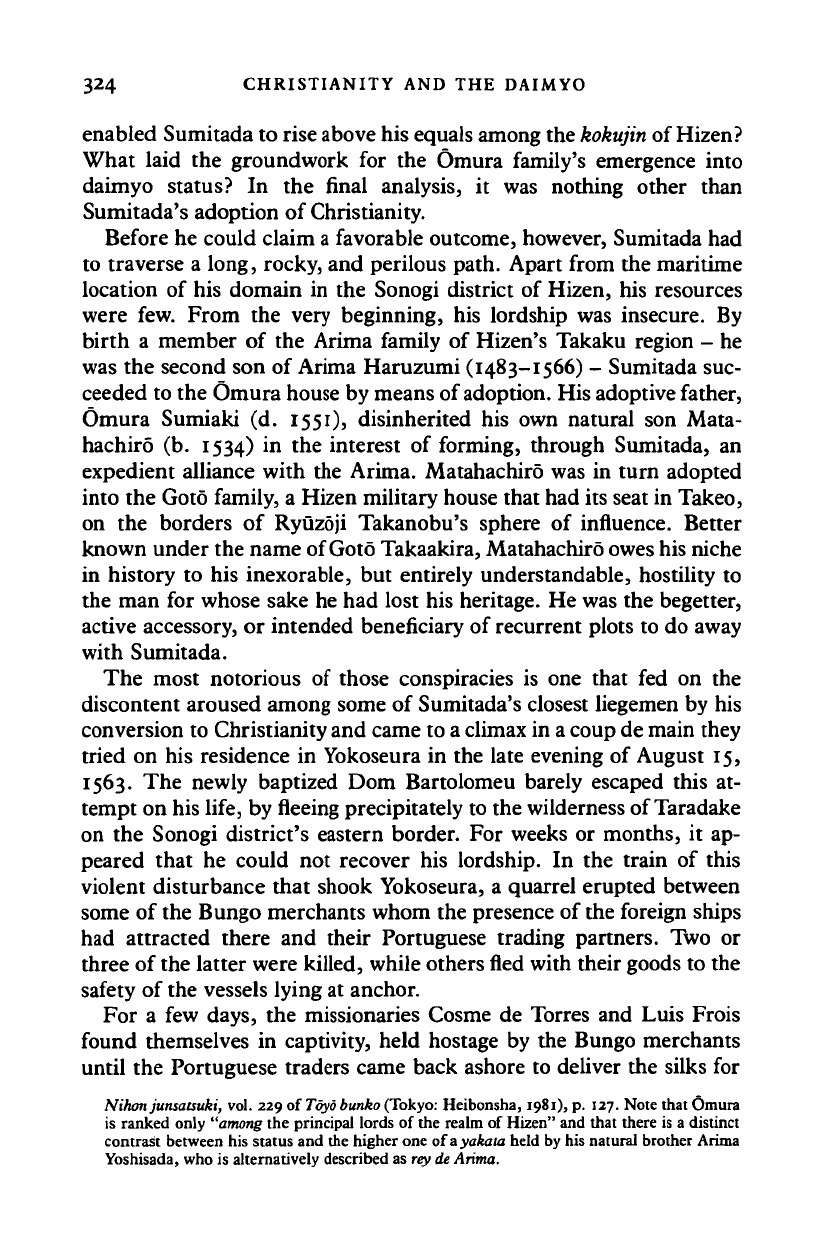
324 CHRISTIANITY AND THE DAIMYO
enabled Sumitada to rise above his equals among the
kokujin
of Hizen?
What laid the groundwork for the Omura family's emergence into
daimyo status? In the final analysis, it was nothing other than
Sumitada's adoption of Christianity.
Before he could claim
a
favorable outcome, however, Sumitada had
to traverse a long, rocky, and perilous path. Apart from the maritime
location of his domain in the Sonogi district of Hizen, his resources
were few. From the very beginning, his lordship was insecure. By
birth a member of the Arima family of Hizen's Takaku region - he
was the second son of Arima Haruzumi (1483-1566) - Sumitada suc-
ceeded to the Omura house by means of
adoption.
His adoptive father,
Omura Sumiaki (d. 1551), disinherited his own natural son Mata-
hachiro (b. 1534) in the interest of forming, through Sumitada, an
expedient alliance with the Arima. Matahachiro was in turn adopted
into the Goto family, a Hizen military house that had its seat in Takeo,
on the borders of Ryuzoji Takanobu's sphere of influence. Better
known under the name of Goto Takaakira, Matahachiro owes his niche
in history to his inexorable, but entirely understandable, hostility to
the man for whose sake he had lost his heritage. He was the begetter,
active accessory, or intended beneficiary of recurrent plots to do away
with Sumitada.
The most notorious of those conspiracies is one that fed on the
discontent aroused among some of Sumitada's closest liegemen by his
conversion to Christianity and came to a climax in a coup de main they
tried on his residence in Yokoseura in the late evening of August 15,
1563.
The newly baptized Dom Bartolomeu barely escaped this at-
tempt on his life, by
fleeing
precipitately to the wilderness of Taradake
on the Sonogi district's eastern border. For weeks or months, it ap-
peared that he could not recover his lordship. In the train of this
violent disturbance that shook Yokoseura, a quarrel erupted between
some of the Bungo merchants whom the presence of the foreign ships
had attracted there and their Portuguese trading partners. Two or
three of the latter were killed, while others fled with their goods to the
safety of the vessels lying at anchor.
For a few days, the missionaries Cosme de Torres and Luis Frois
found themselves in captivity, held hostage by the Bungo merchants
until the Portuguese traders came back ashore to deliver the silks for
Nihon junsatsukt, vol. 229 of
Toyo
bunko (Tokyo: Heibonsha, 1981), p. 127. Note that Omura
is ranked only "among the principal lords of the realm of Hizen" and that there is a distinct
contrast between his status and the higher one oiayakaia held by his natural brother Arima
Yoshisada, who is alternatively described as rey de Arima.
Cambridge Histories Online © Cambridge University Press, 2008
